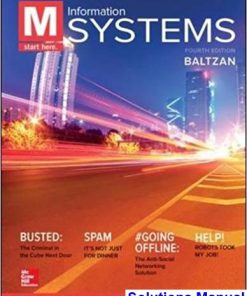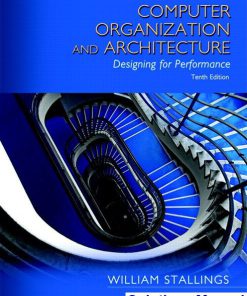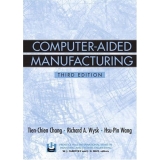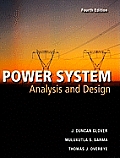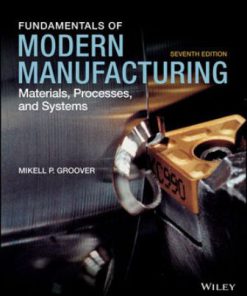Automation Production Systems and Computer Integrated Manufacturing 4th Edition Groover Solutions Manual
$35.00 Original price was: $35.00.$26.50Current price is: $26.50.
Automation Production Systems and Computer Integrated Manufacturing 4th Edition Groover Solutions Manual
Automation Production Systems and Computer Integrated Manufacturing 4th Edition Groover Solutions Manual
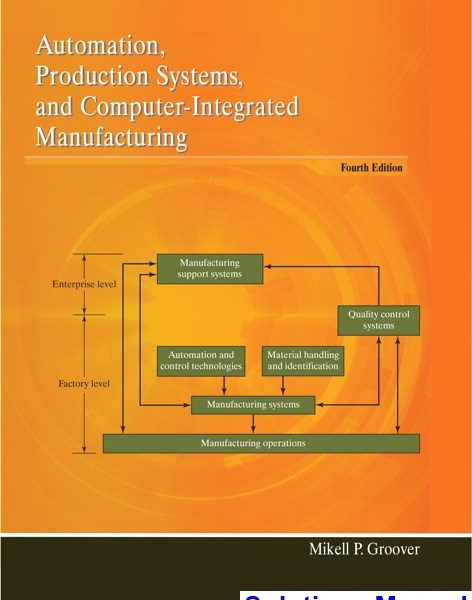
Product details:
- ISBN-10 : 0133499618
- ISBN-13 : 978-0133499612
- Author: Mikell P. Groover
Automation, Production Systems, and Computer-Integrated Manufacturing is appropriate for advanced undergraduate/ graduate-level courses in Automation, Production Systems, and Computer-Integrated Manufacturing. The book should also be useful for practicing engineers and managers who wish to learn about automation and production systems technologies in modern manufacturing.
This exploration of the technical and engineering aspects of automated production systems provides the most advanced, comprehensive, and balanced coverage of the subject of any text on the market. It covers all the major cutting-edge technologies of production automation and material handling, and how these technologies are used to construct modern manufacturing systems.
Table contents:
Chapter1 INTRODUCTION
1.1 Production Systems
1.2 Automation in Production Systems
1.3 Manual Labor in Production Systems
1.4 Automation Principles and Strategies
1.5 About This Book
PART I OVERVIEW OF MANUFACTURING
Chapter2 MANUFACTURING OPERATIONS
2.1 Manufacturing Industries and Products
2.2 Manufacturing Operations
2.3 Production Facilities
2.4 Product/Production Relationships
Chapter3 MANUFACTURING METRICS AND ECONOMICS
3.1 Production Performance Metrics
3.2 Manufacturing Costs
Appendix 3A Averaging Formulas for Equation (3.20)
PART II AUTOMATION AND CONTROL TECHNOLOGIES
Chapter4 INTRODUCTION TO AUTOMATION
4.1 Basic Elements of an Automated System
4.2 Advanced Automation Functions
4.3 Levels of Automation
Chapter5 INDUSTRIAL CONTROL SYSTEMS
5.1 Process Industries versus Discrete Manufacturing Industries
5.2 Continuous versus Discrete Control
5.3 Computer Process Control
Chapter6 HARDWARE COMPONENTS FOR AUTOMATION AND
PROCESS CONTROL
6.1 Sensors
6.2 Actuators
6.3 Analog–Digital Conversions
6.4 Input/Output Devices for Discrete Data
Chapter7 COMPUTER NUMERICAL CONTROL
7.1 Fundamentals of NC Technology
7.2 Computers and Numerical Control
7.3 Applications of NC
7.4 Analysis of Positioning Systems
7.5 NC Part Programming
Appendix 7A: Coding for Manual Part Programming
Chapter8 INDUSTRIAL ROBOTICS
8.1 Robot Anatomy and Related Attributes
8.2 Robot Control Systems
8.3 End Effectors
8.4 Applications of Industrial Robots
8.5 Robot Programming
8.6 Robot Accuracy and Repeatability
Chapter9 DISCRETE CONTROL AND PROGRAMMABLE LOGIC
CONTROLLERS
9.1 Discrete Process Control
9.2 Ladder Logic Diagrams
9.3 Programmable Logic Controllers
9.4 Personal Computers and Programmable Automation Controllers
PART III MATERIAL HANDLING AND IDENTIFICATION
Chapter 10 MATERIAL TRANSPORT SYSTEMS
10.1Overview of Material Handling
10.2Material Transport Equipment
10.3Analysis of Material Transport Systems
Chapter 11 STORAGE SYSTEMS
11.1 Introduction to Storage Systems
11.2Conventional Storage Methods and Equipment
11.3Automated Storage Systems
11.4Analysis of Storage Systems
Chapter12 AUTOMATIC IDENTIFICATION AND DATA CAPTURE
12.1Overview of Automatic Identification Methods
12.2Bar Code Technology
12.3Radio Frequency Identification
12.4Other AIDC Technologies
PART IV MANUFACTURING SYSTEMS
Chapter 13 OVERVIEW OF MANUFACTURING SYSTEMS
13.1Components of a Manufacturing System
13.2Types of Manufacturing Systems
Chapter 14 SINGLE-STATION MANUFACTURING CELLS
14.1Single-Station Manned Cells
14.2Single-Station Automated Cells
14.3Applications of Single-Station Cells
14.4Analysis of Single-Station Cells
Chapter 15 MANUAL ASSEMBLY LINES
15.1Fundamentals of Manual Assembly Lines
15.2Analysis of Single-Model Assembly Lines
15.3Line Balancing Algorithms
15.4Workstation Details
15.5Other Considerations in Assembly Line Design
15.6Alternative Assembly Systems
Appendix 15A Batch-Model and Mixed-Model Lines
Chapter 16 AUTOMATED PRODUCTION LINES
16.1Fundamentals of Automated Production Lines
16.2Applications of Automated Production Lines
16.3Analysis of Transfer Lines
Appendix 16A Transfer Lines with Internal Storage
Chapter 17 AUTOMATED ASSEMBLY SYSTEMS
17.1Fundamentals of Automated Assembly Systems
17.2Analysis of Automated Assembly Systems
Chapter 18 GROUP TECHNOLOGY AND CELLULAR MANUFACTURING
18.1Part Families and Machine Groups
18.2Cellular Manufacturing
18.3Applications of Group Technology
18.4Analysis of Cellular Manufacturing
Appendix 18A Opitz Parts Classification and Coding System
Chapter 19 FLEXIBLE MANUFACTURING CELLS AND SYSTEMS
19.1What is a Flexible Manufacturing System?
19.2FMC/FMS Components
19.3FMS Application Considerations
19.4Analysis of Flexible Manufacturing Systems
19.5Alternative Approaches to Flexible Manufacturing
PART V QUALITY CONTROL SYSTEMS
Chapter 20 QUALITY PROGRAMS FOR MANUFACTURING
20.1Quality in Design and Manufacturing
20.2Traditional and Modern Quality Control
20.3Process Variability and Process Capability
20.4Statistical Process Control
20.5Six Sigma
20.6Taguchi Methods in Quality Engineering
20.7ISO 9000
Appendix 20A The Six Sigma DMAIC Procedure
Chapter 21 INSPECTION PRINCIPLES AND PRACTICES
21.1Inspection Fundamentals
21.2Sampling versus 100% Inspection
21.3Automated Inspection
21.4When and Where to Inspect
21.5Analysis of Inspection Systems
Chapter 22 INSPECTION TECHNOLOGIES
22.1Inspection Metrology
22.2Conventional Measuring and Gaging Techniques
22.3Coordinate Measuring Machines
22.4Surface Measurement
22.5Machine Vision
22.6Other Optical Inspection Methods
22.7Noncontact Nonoptical Inspection Techniques
Appendix 22A Geometric Feature Construction
PART VI MANUFACTURING SUPPORT SYSTEMS
Chapter 23 PRODUCT DESIGN AND CAD/CAM IN THE PRODUCTION
SYSTEM
23.1Product Design and CAD
23.2CAM, CAD/CAM, and CIM
23.3Quality Function Deployment
Chapter 24 PROCESS PLANNING AND CONCURRENT ENGINEERING
24.1Process Planning
24.2Computer-Aided Process Planning
24.3Concurrent Engineering and Design for Manufacturing
24.4Advanced Manufacturing Planning
Chapter 25 PRODUCTION PLANNING AND CONTROL SYSTEMS
25.1 Aggregate Production Planning and the Master Production
Schedule
25.2Material Requirements Planning
25.3Capacity Planning
25.4Shop Floor Control
25.5Inventory Control
25.6Manufacturing Resource Planning (MRP II)
25.7 Enterprise Resource Planning (ERP)
Chapter 26 JUST-IN-TIME AND LEAN PRODUCTION
26.1Lean Production and Waste in Manufacturing
26.2Just-in-Time Production Systems
26.3Autonomation
26.4Worker Involvement
Appendix Answers to Selected Problems
People also search:
automation production systems and computer-integrated manufacturing 4th edition
what are the 4 production systems
|
automation systems meaning
what are the four 4 classifications of production systems
examples of automation system
what is automation in production
|
You may also like…
Solution Manual
Solution Manual
Solutions Manual to accompany Computer-Aided Manufacturing 3rd edition 9780131429192
Solution Manual
Solutions Manual to accompany Power Systems Analysis and Design 4th edition 9780534548841
Solution Manual
Solution Manual
Solution Manual for Work Systems: The Methods, Measurement & Management of Work Mikell P. Groover
Solution Manual
Integrated Advertising Promotion and Marketing Communications 7th Edition Clow Solutions Manual





